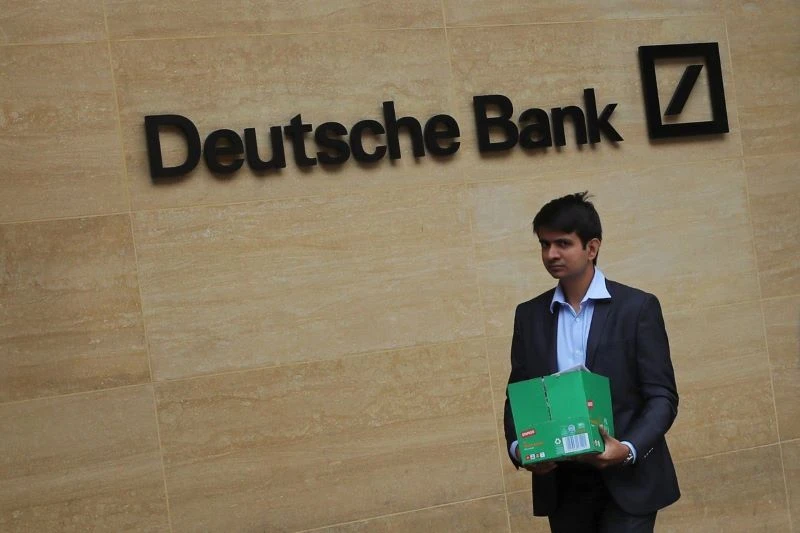
Deutsche Bank AG was quick to start firing staff from its investment bank on Monday. Its investors will need to wait much longer to discover how the German lender’s radical restructuring will affect them.
Shares in the troubled global banking group fell sharply as investor skepticism set in during Monday’s trade. The stock was down as much as 7.25% in the afternoon, its biggest one-day fall this year and a big reversal from a rise of more than 4% shortly after the open. It finished the day down 5.4%.
Chief Executive Christian Sewing gave more details in presentations on Monday of a plan to cut 18,000 jobs, slash group expenses by 25% and quit large areas of the investment banking business, a big drag on its performance.
He admitted returns have been unacceptably low and costs too high. “Too many resources went to businesses where we don’t compete to win,” he said. “Simply put, we kept too many options open,” he said.
Despite the big promises, some shareholders said it would take time to see any results.
The restructuring appeared to go much further than expected in cutting businesses, and there was relief among investors that the bank said it didn’t expect to ask shareholders for fresh capital to help pay for thousands of job cuts.
The costs of the overhaul will push Deutsche Bank into reporting a net loss of €2.8 billion ($3.14 billion) for the second quarter when it reports results on July 24. Analysts applauded the ambition of the plans, but were cautious because such major changes to the business could lead to greater costs and revenue losses than the bank expects, potentially leaving it still in need of capital. James von Moltke, chief financial officer, said there was significant uncertainty over whether the bank would break even in 2020.
Some analysts were skeptical of the bank’s optimism over expected returns on equity, mainly because of doubts about its revenue forecasts even though it has targeted only 2% growth a year for its core businesses.
“The renunciation of a capital increase is basically positive, but will burden the bank’s earning power for years to come,” said Alexandra Annecke, portfolio manager at Union Investment in Germany. “The shareholders still need staying power.”
Mr. Sewing attempted to show his own staying power and faith in the plan by pledging to invest a substantial amount of his own fixed salary into Deutsche Bank stock.
Most of the cuts will come in equities trading, while in Asia the bank will shut the majority of its equity-raising business, too, according to people familiar with the plans. Some staff in Asia and London were told they had lost their jobs on Monday, but there was less activity at the bank’s Frankfurt headquarters.
“It is pretty apparent that within CIB [the investment bank] a lot of people didn’t really show up today in Frankfurt, I think out of feelings of depression more than anything else,” said one investment bank employee who didn’t want to be named. “It’s like a ghost town.”
“The days of spectacular ambition in this [investment-banking] division are behind us,” Mr. Sewing told reporters on Monday. He said the bank will focus its resources on companies rather than hedge funds or other asset managers, and invest in areas like cash management for European clients where it can earn more stable and sustainable profits. “We will reconnect this bank to what it used to be.”
That said, it has no plans to trim down its U.S.-focused business of creating and selling risky loans for private-equity backed companies, according to Mr. Sewing, despite widespread warnings from regulators and others of the growing risks in this market.
It will also continue to produce equity research as a stand-alone product to sell to institutional investors even though it won’t offer equities trading. The bank said equity and macroeconomic research would support its advisory work for companies looking to do deals or list their shares on stock markets in its remaining equity capital markets business.
“Deutsche has a good product, but it is pretty hard to make money from stand-alone equity research,” said Daniel Davies, a managing director at Frontline Analysts, an outsourcing and training firm for financial analysts. “This may have been cooked up by a manager who doesn’t understand the importance of being in the flow of equity trading when it comes to equity capital markets.”
Deutsche Bank also plans to spend €13 billion on technology and another €4 billion on improving its control even as it tries to cut €6 billion of costs. The bank has been hit by fines from U.S. and European watchdogs for a range of compliance failures and risky transactions in Russia and elsewhere.
Two congressional committees are probing the bank’s money-laundering controls broadly, along with its ties to President Trump, his campaign and people and entities connected to him.




















